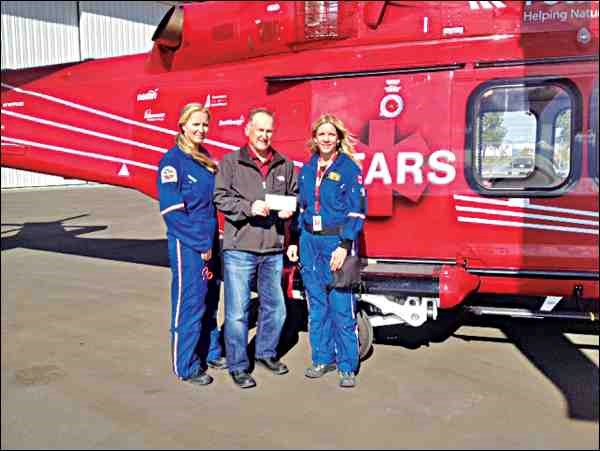Donations to the army and air cadets and to the STARS Air Ambulance represent the final acts for the now-disbanded Battlefords Search and Rescue Club.
The club voted to disband earlier this year, unable to continue mainly due to the high costs of liability insurance.
"It got prohibitive for us to operate," said its president Gregg Sheppard, who said it cost between $2,500 to $3,000 for that alone. "And we only had 12 members at the end."
In winding down its operations, the club had some money left over to donate to worthwhile causes. According to Sheppard, equipment was donated to the army cadets.
A few other items were sold and about $1,000 from that was donated to the air cadets as well.
In addition, there was over $1,200 in funds remaining and that was donated to the STARS rescue organization.
STARS, which runs air ambulance services in Saskatchewan, heavily relies on fundraising efforts in order to keep its operations going.
Sheppard said when he went to STARS in Saskatoon to make the donation, he was able to tour the facility and see their new helicopter - a state-of-the-art "Limousine," that has longer mileage to reach out to victims who need help."
The Battlefords has seen the highest number of STARS missions of any community in the province, according to STARS figures.
The liability insurance issue has proved the undoing for other search and rescue clubs across the country that have also disbanded.
Clubs had ended up embroiled in lawsuits, whether accidental or through a search member getting hurt.
One club in British Columbia was sued and was found liable in court, and had to be bailed out by the B.C. government.
As a result of these cases, the "liability insurance went sky high on us," said Sheppard, to the point where it was "prohibitive for us to operate on an annual basis."
Other clubs in the bigger centres have been able to ride it out and survive, but clubs in smaller centres have felt the squeeze the most.
Not only were individual members liable for any of their search and rescue activities, but the local club could not even do training without liability concerns. Clubs faced the possibility of lawsuits from their own members who might get into accidents and then allege they were improperly trained.
Because their club wasn't covered on their individual training, they stopped training, said Sheppard. Because of that, "we're not prepared to go out on search and rescues anymore. So it was kind of a revolving catch 22."
"I feel bad about it because in our initial inaugural meetings, informational meetings, we had in excess of about 80 people six or seven years ago at the Battlefords Wildlife Federation," Sheppard said.
The group had been able to participate in grid searches and other searches alongside the RCMP. Their search and rescue training - map reading, compass reading - as well as Red Cross and first aid treatments that were taught to them, has helped the members in everyday life, Sheppard said.
Sheppard himself was able to put his own first aid training to use to save the life of his brother-in-law who suffered cardiac arrest. He performed CPR and the patient ultimately was transported to University Hospital in Saskatoon by STARS for treatment.
Sheppard was happy to see some good come of the remaining funds from the organization. Still, he called it "demoralizing" to disband the club after the initial enthusiasm.
Some club members have become involved in Red Cross or different organizations. Sheppard is urging people to not be afraid to get involved in different organizations.
As for the future of search and rescue efforts in general, Sheppard believes it will eventually come back, but in a different form.
He thinks it will more likely be a more centralized effort with heavier government involvement and funding to cover the liability issues. Lobbying efforts to bring it back through some arm's length program are under way, and Sheppard is optimistic those efforts will be successful.
"Eventually, federally and provincially, there will be funding for non profit volunteer organizations," said Sheppard.
"But I see that as being down the road."




